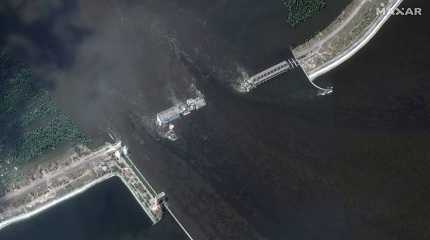
KYIV, June 9 (Reuters) - Evidence was growing on Friday that there was an explosion at the Kakhovka dam in southern Ukraine around the time it collapsed, according to Ukrainian and U.S. intelligence reports and seismic data from Norway.
Ukraine's security service said it had intercepted a telephone call proving a Russian "sabotage group" blew up the Kakhovka hydroelectric station and dam early on Tuesday in the Kherson region.
Norway's research foundation Norsar said that data collected from regional seismic stations showed clear signals of an explosion.
And U.S. spy satellites detected an explosion at the dam, a U.S. official was quoted as saying by the New York Times.
The destruction early on Tuesday of the facility - which had been in Russian hands since shortly after Russia's full-scale invasion of Ukraine in February 2022 - unleashed mass flooding, forcing thousands of residents to flee and wreaking environmental havoc.
The Security Service of Ukraine (SBU) posted a one-and-a-half minute audio clip on its Telegram channel of the alleged conversation, which featured two men who appeared to be discussing the fallout from the disaster in Russian.
Reuters could not independently verify the recording.
Russia has accused Kyiv of destroying the dam. The Russian foreign ministry did not immediately reply to a Reuters request for comment on the SBU statement.
"They (the Ukrainians) didn't strike it. That was our sabotage group," said one of the men on the recording, described by the SBU as a Russian soldier. "They wanted to, like, scare (people) with that dam."
"It didn't go according to plan, and (they did) more than what they planned for."
The man also said "thousands" of animals had been killed at a "safari park" downstream as a result.
The other man on the line expressed surprise at the soldier's assertion that Russian forces had destroyed the dam.
The SBU offered no further details of the conversation or its participants. It said it had opened a criminal investigation into war crimes and "ecocide".
"The interception by the SBU confirms that the Kakhovskaya HPP (Hydroelectric Power Plant) was blown up by a sabotage group of the occupiers," the SBU said in a statement. "The invaders wanted to blackmail Ukraine by blowing up the dam and staged a man-made disaster in the south of our country."
The U.S. official said that satellites equipped with infrared sensors detected a heat signature consistent with a major explosion.
Norsar said in a statement that the data from one seismic
station in Romania showed activity at 02:54 a.m. local time on Tuesday, indicating an explosion, and the timing coincides with media reports of the dam collapse.
Together with the power station, the dam helped provide electricity, irrigation and drinking water to southern Ukraine, including Crimea, which was annexed by Russia in 2014.
Water levels were high in the reservoir in the buildup to the explosion, media reported.
Hundreds of Ukrainians were rescued from rooftops in the flooded areas during the week. The governor of the southern region of Kherson said some 600 square kilometres, or 230 square miles, were under water.
"By blowing up the Kakhovskaya HPP dam, the Russian Federation definitively proved that it is a threat to the entire civilised world," SBU chief Vasyl Malyuk was quoted as saying in the statement.
"Our task is to bring to justice not only the leaders of (Russian President Vladimir) Putin's regime, but also the ordinary perpetrators of crimes," he said.




